Myth in Fiction Intertwined:
How One Author Wove His Tapestry
by Birgitte Rasine, author, publisher, and entrepreneur. Follow Birgitte on Twitter(@birgitte_rasine), Facebook, Google Plus or Pinterest.

I recently spoke with Dr. Kenneth Atchity, the author of The Messiah Matrix. Classical scholar and Yale-educated professor of literature and classics as well as film producer, publisher, book reviewer, and literary agent, Dr. Atchity wears many hats—yet none perhaps as enthralling as that of author.
Birgitte Rasine: What was the initial inspiration for "The Messiah Matrix"?
Ken Atchity: I'd been thinking about the subject matter for a long time—since high school, when my Jesuit teacher drew a parallel between the two JC's, Jesus Christ and Julius Caesar. Both were said to walk on water, both performed miracles, both gave their lives for their people. So over the years it kept me thinking. Then I met a woman doing research on the topic, and eventually we came to the conclusion I need to write a novel.
BR: What made you decide to write a novel as opposed to a book of non fiction?
KA: The more I researched, the more I realized this story really needs to be told. If I'd written a non fiction book, 56 people would read it during my lifetime. With fiction, thousands of people have read it and hundreds have submitted reader reviews—and hopefully that's just the beginning.
BR: How long did it take to write, and how many drafts did you go through?
KA: It took a year to write the first draft. I revised, restructured, and reshaped for two years, and polished the writing and checked the research for another year. All told the book took about four years. I wrote at least 40 drafts of this book. The last 20 were either cutting research or figuring out how to dramatize it. My favorite chapter is "Birth of a God," a spectacle that Augustus stages for the people to make his divinity real to them. I couldn't imagine this Emperor not staging a show like this.
BR: How much research did you do and how did you go about it?
KA: It took many years of research. During that time, I came across a remarkable book published in 1898, "The Worship of Augustus Caesar," written by Alexander Del Mar, a former postmaster general who happened to be a numismatist. He'd studied the coins minted during the reign of Augustus and showed how every element of Roman Catholic worship can be traced to Augustus: the title of Pontifex Maximums, the tiara the Pope wears, his titles "Savior," "Messiah," "Anointed One," "Awaited One," "Prince of Peace," "King of Kings," even the golden flail he carried to signify he was a good shepherd of his people.
The more I looked into it, the more I saw this was a remarkable historical explanation for the various symbols of the Catholic faith—that made more sense to me than the unproven stories of a "real Jesus" walking barefoot around Palestine. In fact, I went to the catacombs of Rome to see for myself. The symbols of early Christianity can be traced back to Roman origins. The image of Mary with the serpent at her feet, for example, goes back to Bona Dea, the "good goddess," the first Roman goddess of abundance and birth. It was Augustus who had the depictions of Bona Dea redone with the likeness of his own mother, Maia. That's how the iconography related with Mary started.
What Augustus did was both ingenious and profound. He rewrote the history of his time and resculpted myth in his image. He commissioned Virgil to write the Aeneid; he had the Sibylline books edited; he had the scribes from the various nations that formed a part of the Roman Empire rewrite the historical texts, inserting predictions of his coming, predictions of a golden age and a golden child, the lion lying down with the lamb. His coins were struck with the inscription, "God and Son of God."
Why? It goes back to myth. Augustus knew the way to leave a lasting impression on the world is to create a new myth, or associate with an old one—in his case, that of the redeemer-god who gives his life for his people (following Dionysus, Osiris, and many others). The Romans had confusing and fragmented myths, so he streamlined and unify them. He was a brilliant emperor who copied the cultural icons and concepts of his own time and sought to turn them into a global religion. The Roman Empire never ended; it's alive today in the Roman Catholic Church, headquartered in Vatican City in the heart of Rome, where even the ATM screens are in Latin.
BR: How did you handle this rather extraordinary proposition in your novel?
KA: I created a character who was skeptical about Catholicism like I was. Ryan McKeown is a young Jesuit who doesn't understand why there are no provable contemporary references to Jesus Christ. His counter character, archaeologist Emily Scelba, discovers a legendary gold coin that becomes the "smoking gun" to the theory they discover about Christianity's imperial origins.
BR: What was the most challenging aspect of writing a thriller like this?
KA: Dramatizing the research and trying to make it believable and not totally expository. You're dealing with a lot of ancient history, and you have to find ways other than expository dialogue to make it come alive. For example, the cave at Cumae, which actually exists, I described it in the context of the narrative, not necessarily exactly the way it is.
BR: What are the key differences between a typical historical fiction novel and a thriller that incorporates mythology?
KA: Some authors write historical thrillers—they only deal with history, not myth. I was dealing with how a myth is constructed. The basic structure of a myth is always the same, but the narrative elements vary. Even Dan Brown doesn't deal with myth, he deals with artifacts and history. A myth makes you think on a different level. Being conscious of storytelling is different than telling a story. Myth is about the power of storytelling. That's the difference.
BR: What aspect of "The Messiah Matrix" has resonated most with your readers, and what aspect were they most critical of?
KA: I think every Catholic who is serious intellectually [about their faith] has had doubts about whether Jesus really lived or not. Writers always write for their ideal reader, not for "everyone." So when your readers respond to your own doubts, you know you've reached them. As far as criticism is concerned, some readers thought there was too much historical material to digest, but then many thought there should be more.
BR: Share your thoughts about the role myth plays in contemporary literature.
KA: Myth is in our DNA, and it's at the heart of every piece of literature. What do writers do when they're at a loss for a story? They consult myth. A writer should always ask, "what's the myth beneath my story?" If something doesn't feel right, then the myth has been betrayed or the storyteller wasn't aware of the myth within the story. Fiction without myth is never going to be satisfying.
BR: What would your advice be to writers tackling myth in fiction for the first time?
KA: Read a book of mythology. Learn what the myths are. Get a dictionary of mythology. For example, "The Greek Myths" by Robert Graves, "Funk & Wagnalls Standard Dictionary of Folklore, Mythology, and Legend," or "The Masks of God" series by Joseph Campbell.


Suspense Radio
Los Angeles, CA
Suspense Radio, brings you the best of the best in suspense / thriller / mystery and horror.
One-on-one radio interview with Ken Atchity, October 27th 2013.
http://www.blubrry.com/suspenseradio/1900015/suspense-radio-one-on-one-with-ken-atchity-oct-272013/

October 9th 2013
Why Did You Write Such a Heavily-Researched Book as a Novel?
Posted by Jo Linsdell
I've been asked that question numerous times in interviews and emails, and it's a good one. As a former professor, I wrote more than a handful of scholarly books, and certainly could have expanded on the premise of The Messiah Matrix as nonfiction instead of in the format of a romantic thriller.
My main reason for choosing to write it as a novel is that, to quote Muriel Rukeyser, "the universe is made of stories, not of atoms." I wanted this story to reach its maximum audience, and knew it would never do that as a nonfiction "study" of the origins of Christianity in imperial Rome. Even contemporary quantum physicists would agree that without our perception and report reality would not be all it's cracked up to be. If a tree falls in the forest, and there's no one to tell the story it simply doesn't matter whether it fell or not. We humans lead our lives through stories, depending on them as coping mechanisms and guides through the labyrinth of possibilities that face us every day—relying on them as inspiration for continuing the struggle and as consolation when the struggle comes to its inevitable end.
Once in a blue moon an idea comes your way that's worthy of Herman Melville's observation, in Moby Dick: "to write a mighty book you must have a mighty theme." When I started putting together the parallels between Julius and Augustus Caesar and Jesus, I knew no one would take them seriously unless they were presented as part of a contemporary tale of relevance to our world today. I'm not comparing my novel to Moby Dick, nor claiming it's a mighty tale—but its premise was powerful enough to compel me through the forty-something drafts I went through in the four years it was on the drawing board. I'd still like to do some more revising, and will no doubt do so on its way to the screen.
Storytelling is such a privilege that the ancient Greeks put the story teller, teknos, on a par with kings when it came to honoring his appearance in the polis. He was the center of attention because in the preliterate world his songs brought heroic behavior and insight into the human condition to a populace hungry for meaning, for figuring out what life is all about. Today's novelist, making his way from blog to blog in the new frontier that is the Internet, is like that ancient teknos. He is welcome if he tells a story that provokes us, that makes us laugh, or weep, or think.
Story Merchant Dr. Kenneth Atchity believes in the power of stories to change the world (www.storymerchant.com). His first solo novel, The Messiah Matrix, predicted the resignation of the pope and the election of an Argentine Jesuit (www.messiahmatrix.com).


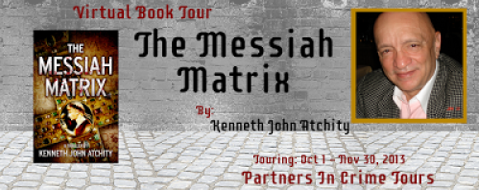
October 1st
Cheryl Masciarelli interviews Dr Kenneth John Atchity
Do you draw from personal experiences and/or current events?
As all novelists do, I draw from both. Oddly enough my novel unwittingly predicted the pope's resignation and the election of an Argentine Jesuit. But it also reflects my adolescent experiences growing up Catholic and wondering if God would really send someone to hell for eating meat on Friday or stealing $5.00 worth of peas instead of $4.99 worth.
Do you start with the conclusion and plot in reverse or start from the beginning and see where the story line brings you?
I do both. I start wherever the sharpest image begins and work backwards or forwards accordingly. That's the beauty of this computer age—you can go either way. Write the scene you feel like writing today, and put it wherever it's supposed to go later.
Your routine when writing? Any idiosyncrasies?
Although I'm a morning person, I write any time of day I can steal an hour or two from my editing, managing, coaching and producing. On an ideal day, I write from five to seven a.m. Over the years I've taught myself to write anywhere, and particularly love writing on the plane. I use a stopwatch to make sure I get my two hours in every day.
Is writing your full time job? If not, may I ask what you do by day?
I've never written full time. I write when I have something to say or have a story to tell, which has, I admit, gotten to be more and more often. My day job is coaching other storytellers on how to get their stories to their maximum audiences in today's challenging and changing world—and editing, managing, representing, and producing stories.
Who are some of your favorite authors?
Aside from my own clients, my favorite authors go back to Homer, Virgil, Dante, Shakespeare, Cervantes, Sterne, Wallace Stevens, Thomas Hardy, Melville, Garcia-Marquez, and Carlos Ruiz Zafón.
What are you reading now?
Preparatory to writing The Hong Kong Reversion, I'm rereading Ian Fleming's wonderful James Bond books as well as James Patterson, and Viktor Frankl's Man's Search for Meaning. I read all day, for joy, for research, and because my dayjob is helping storytellers find their audiences.
Are you working on your next novel? Can you tell us a little about it?
I'm currently working on AFI, Inc., the first in a series of memoirs, prior to completing The Hong Kong Reversion, a thriller set in Hong Kong.
Your novel will be a movie. Who would you cast?
I'd die to have Claire Danes as Emily Scelba.


Book Promotion: The Messiah Matrix by Kenneth John Atchity
Posted September 17, 2013 by Maria, bookhostage
Today's book promotion comes from Kenneth John Atchity and his book called The Messiah Matrix.
If you like romantic thrillers, take a look below. You might just find another book for your "to read" pile!
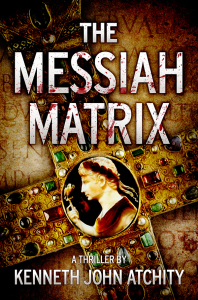
Book: The Messiah Matrix
Author: Kenneth John Atchity
Genre: Romantic Thriller
Publisher: Imprimatur Britannia
Format: Paperback and ebook
Currently Released
Summary: A skeptical young Jesuit meets up in Rome with a vivacious archaeologist who tempts his vows and joins him in an investigation that threatens to overturn their religious beliefs. The book predicted the pope's resignation and the election of an Argentine Jesuit pope.
Q & A:
The best thing about writing this book?
Finding out that what began as a fictional theory gained credence as I fitted the parts of the puzzle together.
Where did you get your idea for this story?
My classical training and research on the Catholic Church and the Roman Empire.
What would you tell aspiring writers out there?
That they should not waste a moment of their time agonizing. Write the story—sell the story!
What is your favorite book?
Homer's Iliad.
I want to thank Kenneth John Atchity for allowing me to promote his book on my blog.
I hope this post has inspired you to go out and read The Messiah Matrix!
Maria.


Kenneth John Atchity
by Vinny O'Hare
29th July 2013
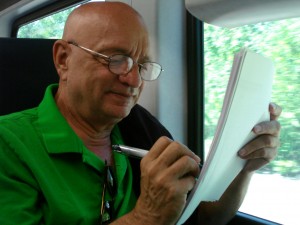
Tell us about yourself and how many books you have written.
At this point I've published over 20 books, and have a half dozen on the drawing board.
What is the name of your latest book and what inspired it?
The Messiah Matrix, a romantic thriller about the origins of Christianity, was inspired by my years as a student of the Roman classics and observations of the parallels between the Roman Catholic Church and the Roman Empire.
Do you have any unusual writing habits?
If writing with a stopwatch running (to make sure I do my hour a day) is unusual, well, then yes I do indeed.
What authors, or books have influenced you?
Virgil and Dante have been a huge influence, and Melville: "to write a mighty book one must have a mighty theme." I think The Messiah Matrix, at the very least, has a mighty theme.
What are you working on now?
I'm working on a family memoir.
What is your best method or website when it comes to promoting your books?
It's very hard to know the answer to this, but Facebook is my very favorite because it's so user-friendly. Check out the Messiah Matrix Facebook page–and LIKE it please.
Do you have any advice for new authors?
Work a little every day, or a lot every day, but every single day; remembering the ancient poet Hesiod, who said, "If you put a little upon a little, soon it will become a lot." Embrace this career that allows for a lifetime of improvement. What other career can offer that?
What is the best advice you have ever heard?
Go for it.
What are you reading now?
I just finished reading a non-stop action sci fi thriller by Russian Sergei Yakimov, and hope to help get it published in the U.S.
What's next for you as a writer?
I am thinking about another novel about the Vatican, a novel about the Millennial generation, in addition to the memoir and more nonfiction books for writers to go with my WRITE series.
What is your favorite book of all time?
Homer's Odyssey.
Ken Atchity's Story Merchant site:
http://storymerchant.com/



16th May 2013
Ok, I loved Dan Brown's books. How sacrilegious, I know. And I call myself a Christian. To me, his books were nothing more than great fictional thrillers. It sparked a few conversations about "what if…" But, that's it. So, when I heard another book exists that rivals Dan Brown's stories, I could not pass up the chance to meet the mind behind that one. Meet Ken Atchity!
Here are the interview highlights:
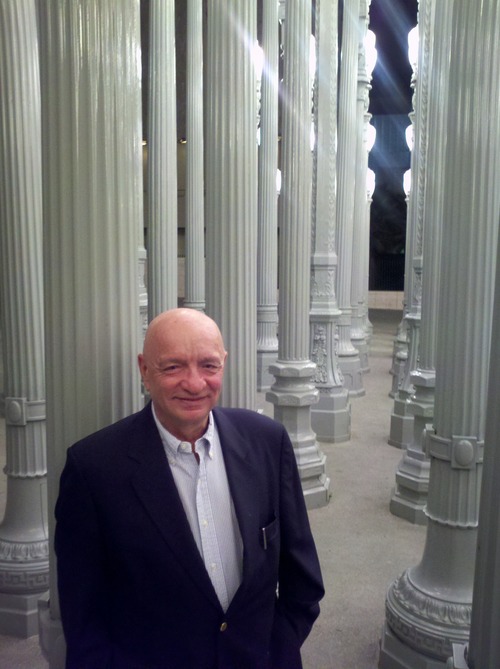
What's the name of your most recent book? If you had to sum it up in 30 words or less, what would you say?
The Messiah Matrix, an iconoclastic thriller that questions the origins of Christianity when the lead characters converge to uncover a secret the Vatican has protected for over two millennia.
What has inspired you to write this book?
My childhood fascination with the parallels between the Roman Empire and the Roman Catholic Church.
Are you religious?
I'm definitely not religious, though I'm interested in the spiritual core and ritual of all religions. I'd call myself spiritual.
Have your religious views impacted this book (Messiah Matrix)? How?
My view of the dangers and damages of organized religion were a major impetus behind this book, which ends with a vision of how humanity can be spiritual without being fanatically organized.
How much of this book (Messiah Matrix) is fact vs. pure fiction?
That's for the reader to decide. Anyone interested can request my long list of sources.
How has Dan Brown influenced your writing?
I decided to write this novel DESPITE its being similar to Dan Brown's books, because I believe its premise is more revolutionary and thought-provoking than the premise of THE DA VINCI CODE, a book I admire.
Did you picture any specific real-life people when you created your characters?
I did have a person in mind for Emily Scelba, the heroine; and a few other characters as well. The most remarkable thing to report is that the book predicts not only a JESUIT pope but an ARGENTINE JESUIT pope. Don't know what I was channeling at the time!
What was the oddest thing you ever had to research while writing?
Probably the diet of Caesar Augustus…
Who designed the cover on your book? (Who designs the covers on your books?)
A British designer designed the cover, James Reid. It rocks!
If you had to do it all over again, what would you change in your latest book?
I'd change the background on how Emily found an ancient Augustan aureus—and I may still do that.
How long does it usually take you to write a book?
It can range from a year to several. Messiah Matrix took about two years.
Do you have a day job? Family? How do you balance it all?
My day job is working with writers to develop their stories into books and films. A family? I'm married to a wonderful woman, and have two great children, and four grandchildren… How do make time to write? I prioritize it and keep my stopwatch running.
What are you reading now?
I'm reading Steve Job's autobiography.
If you were shipwrecked on an island, what three books would you want with you?
Wow. Great question. Probably Moby Dick, Don Quixote, and the Odyssey.
If you could have any author as a mentor, who would it be and why?
I had a wonderful mentor in John Gardner (On Moral Fiction, Grendel, Nickel Mountain, etc.). If I could have another, it'd be Dan Brown because I love how he thinks.
Has there ever been a movie that you thought was better than the book?
Yes, Prince of Tides is one example, though I loved the book too; and Birdy.
What tips do you have for aspiring writers? What have you learned along the way?
I've learned the only rules are never give up, and go for it! Great things are accomplished only by writers who don't quit no matter how hard everything becomes.
What's next for you? Any current/future writing project?
Always. I'm finishing a book of quotes for writers, then will edit and publish my second book of poetry (the first appeared in 1978), then another book for writers. I'm not planning to write another novel until I find another great story.
MORE ABOUT KEN…
With more than forty years experience in the publishing world, and twenty years in entertainment, Dr. Ken Atchity is a self-defined "story merchant" - writer, producer, career coach, teacher, and literary manager, responsible for launching dozens of books and films. His life's passion is finding great storytellers and turning them into bestselling authors and screenwriters. Ken has produced 30 films and 14 books.


Interview with Kenneth John Atchity by Phillip Harris
 http://philipharris.blogspot.co.uk/2013/03/the-messiah-matrix.html
http://philipharris.blogspot.co.uk/2013/03/the-messiah-matrix.html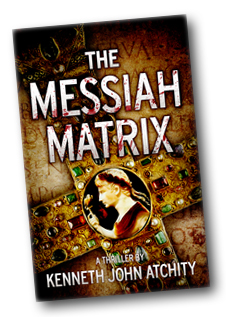
The Messiah Matrix
A timely piece, as the age of worn out dogma comesto an end.
PH: What was your inspiration for writing The Messiah Matrix?
KJA: I've long been intrigued by the parallelism between the first two Caesars, Julius and Augustus, and Jesus Christ. As far back as my Jesuit high school years it was pointed out to me that their histories were strangely intertwined. Then, a few years ago, a client and business partner directed me to a little-known 1899 book on the history of Augustus Caesar titled The Worship of Augustus Caesar. Its author, Alexander Del Mar, (1836–1926) was director of the U.S. Bureau of Statistics during the period 1866-69. He was a respected numismatist as well as U.S. Secretary of the Treasury appointed in 1872. Del Mar's history of Augustus derived from a study of coins, monuments, calendars, eras, and astronomical and astrological cycles. His account established a new chronology and included a survey of history and religion. In the book Del Mar reveals the legerdemain of the early church, conclusively demonstrating how Christianity absorbed pagan religious beliefs and motifs and claimed them as its own. His work exposes hidden religious facts that have been buried for millennia, and reminded me of discoveries I made during my years as a student and professor of classical literature—of "Christian" lines that occur in Aeschylus, Sophocles, and especially Virgil.
PH: Why is The Messiah Matrix relevant today?
KJA: With the resignation of Benedict XVI, and his book on the origins of Christianity and the nativity scene in particular, the issues fictionalized in the novel are now revealed in reality: the internal Vatican politics that go against the spiritual grain, the questioning of the historicity of the Jesus narrative, the long litany of sins committed behind the mask of organized religion, etc.
PH: As a Christian, will I learn anything new about the roots of Christianity in The Messiah Matrix?
KJA: The true history of Christianity has been shrouded in mystery for millennia, partly intentionally and partly out of ignorance. The Messiah Matrix reveals important aspects concerning the roots of Christianity, lost to history until now, that will change the reader's understanding, possibly forever.
PH: Why is Augustus Caesar the central historical figure of The Messiah Matrix?
KJA: Augustus Caesar was the most powerful ruler in the history of Rome, and perhaps the most powerful ruler in the history of the Western World. His Pax Romana, the two-hundred years of peace he established throughout his empire after taming the entire periphery of the Mediterranean, which the Romans referred to as mare nostrum, "our lake," remains unrivalled in world history. He was all-powerful and exerted vast, pervasive influence throughout his Empire, an influence that remains with us to this day. His shrewd policies concerning religious tolerance, celebrated in the construction of the Pantheon in Rome, initially led him to allow continuance of the religions of the nations he conquered. He eventually realized that a multi religious empire would lead to civil unrest so he took measures to create a single religion that he believed would engender peace among the nations.
PH: Is The Messiah Matrix anti-Christian?
KJA: No, if we define Christianity as a way of life incorporating the distillation of thousands of years of spiritual wisdom, then The Messiah Matrix supports that aspect of Christianity wholeheartedly. On the other hand, if we define Christianity as literal history in which the Son of God preached and performed miracles in Judea, the novel demonstrates that this literalist view was deliberately constructed, as readers of the novel will discover. The Messiah Matrix actually glorifies Christianity's origins by revealing the truth about the universal principles at the foundation of the Christian religion.
PH: How can I determine fact from fiction in The Messiah Matrix?
KJA: You'll find a chart of actual historical data versus Biblical/mythical history at the end of the novel. All of the factual elements in this chart can be found in The Messiah Matrix. I've also provided an extensive bibliography listed on this website for the intrepid reader! And I welcome other questions, and your feedback on the subject.

Interview with Kenneth John Atchity by Nadine Maritz 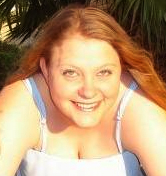
http://my-addictionbooks.blogspot.co.uk/2012/06/interview-with-kenneth-john-atchity.html
Interview with Kenneth John Atchity Author of Homer's Iliad: The Shield of Memory -
Which was his Ph.D. Dissertation. The work was awarded Yale Graduate School's Highest Academic Honor - The Porter Prize; and was later published by Southern Illinois University Press (Edited by John Gardner). Mentors at Yale Included Thomas Bergin, Thomas Greene, A. Bartlett Giamatti, Richard Ellinger, Eric Segal and Lowry Nelson Jr.
His Twenty Books Include:
· Homer: Critical Essays (G.K.Hall),
· The Renaissance Reader (HarperCollins),
· The Classical Greek Reader (Harper-Oxford University Press),
· Italian Literature: Roots & Branches (Yale University Press),
· A Writer's Time (W.W. Norton)
· Seven Ways to Die (with William Diehl) (Story Merchant Books)
· And The Classical Roman Reader (Harper-Oxford)
Kenneth represents writers of both fiction and nonfiction. He accounts for numerous bestsellers and movies both produced in television and
on the big screen. In 2011 he was nominated for an Emmy Award for Producing "The Kennedy Detail."
We are very pleased to introduce our readers to his latest addition to storytelling which is his first novel called The Messiah Matrix.
Kenneth – thank you so much for giving me this interview. From the interviews I have done so far over the past year I'm fairly positive that
you must be one of the most aspiring authors I have ever done an interview on.
Thank you, Nadine. I'm definitely aspiring!
1. As a start I always like for authors to tell us a bit about themselves. Where did your journey start, what made you start writing?
I'm sure it was my mother egging me on from the kitchen as I sat at the table turning an essay into a short story. She came up with some preposterous plots, but I modified them and made them work. Her mantra was "go for it"!
2. I have to ask (and I know I have asked some other authors the same thing), how do you approach your writing? A lot of writers build their story.
They first develop their characters, then develop their plot and then start writing. Others just jump into it from the word go.
Every project is different, but the FIRST THING I always do is to carve out time each day to work on my current 'creative project.'
Without time, we have nothing—and it is time that gets work done.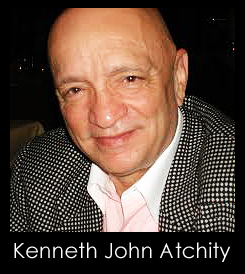
3. Another question that I have asked before but would like your input on is how do you treat sequel writing? As an author (unpublished but striving)
myself, I had written my 1st novel, whilst I was going / am going through the editing process I started work on its sequel. I found that as my story progressed there was some stuff that came up that I wanted to add into the first novel which I thought would tie them together. Do you experience similar notions? If you did how do you deal with it?
I don't have the 'sequel problem' you're experiencing. I focus on the story at hand, which is challenge enough in itself. I can see how that would get complicated though, and would have to understand in more detail to comment usefully.
4. From basic reviews I had obtained on The Messiah Matrix I concluded that the novel covers a great story that is layered with romance, believable characters, wonderful settings and an unpredictable ending. Would you mind elaborating a bit on what readers could expect?
Readers can expect to be drawn into one of the greatest mysteries of the last two thousand years—how did the story of Jesus Christ get started? What is its provable historical roots?
5. Where can readers follow your novels and latest updates?
The Messiah Matrix has its own website, www.messiahmatrix.com. We'd love nothing more than questions from readers on the blog section of that website. For my progress in general, check out kenatchity.blogspot.com and storymerchant.com. Messiah and Seven Ways to Die also have their own Facebook pages.
6. The novel has reached number one on kindle. How do you feel about that?
I was happily surprised, especially in England where it's high on many lists and selling very well despite the fact that we haven't begun to market it yet.
7. Some readers claim that this novel was far better than the Da Vinci Code. This is high praise, what are your views?
Of course I knew the book would be compared to Dan Brown, whom I admire. My view is that the issues Messiah Matrix deals with are much more monumental—the very origins of Christianity—than Da Vinci, but I admire his mastery of detail, which I couldn't hope to equal.
8. Where did the idea come from for the writing of the Messiah Matrix?
It came from my Roman Catholic upbringing, and the doubts I began having at the age of 15 about the "facts" of the life of Jesus, and the "rules" of the Catholic Church. For example, everyone who ate meat on Fridays went to hell for all eternity if they didn't receive confession before they died. THEN the Church changed the rules and said it's okay to eat meat on Friday. So what happened to all those souls in hell for eating meat on Friday? The answer is that they're still there because those were the rules when they were alive. Hmmm, I thought, what kind of God acts like that? Do these rules, in fact, have anything to do with God at all? Read the novel and find out.
9. As a Christian, what can readers expect to discover with regards to the roots of Christianity, anti-Christian perspectives and general religious views.
The book is very respectful of Christianity, and its basic peaceful doctrines; it's much less tolerant of organized religion, which I personally believe is one of the greatest causers of violence the world has ever known. If read properly, the book actually acclaims that Christianity was founded in a magnificent way that should make everyone even prouder to be a Christian.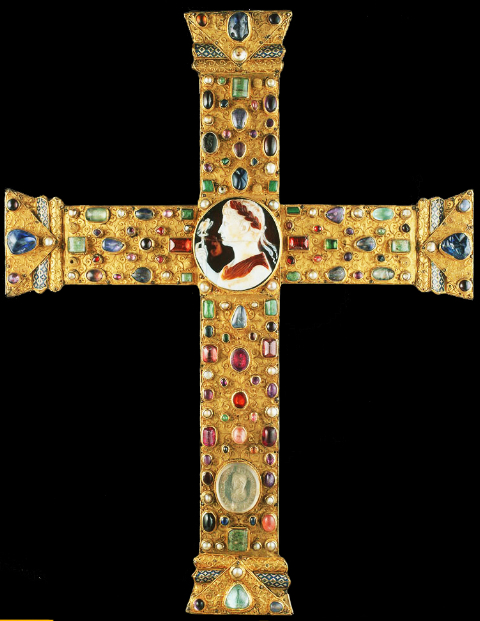
10. You recently did an article on CNN religion's site that read "the Jesus debate: man vs. myth.
The article covers Timothy Freke's discovery of a religious image that some would call obscene. From the description it was of a drawing from a third-century amulet depicting a naked man nailed to a cross. The name on the amulet however isn't that of Jesus of Nazareth, instead it was a pseudonym for Osiris-Dionysus, a pagan god in ancient Mediterranean culture. How was this article received within the public? What's your personal conclusion?
Why is a man hanging on a cross obscene if it's Orpheus (not Osiris) and not obscene if it's Jesus? Geez, this kind of stuff makes me nuts. The name on the amulet is actually Orpheus—Bacchus (another name of Dionysus).
11. As an author, can you give struggling authors any advice on the way forward?
The way forward is persistence. Never give up. And, as the late great Ray Bradbury said, "Start writing more. It'll get rid of all those moods you're having!"
12. Final quote/ inspiration note.
"Go for it!" and read The Messiah Matrix, and review it for amazon.


















